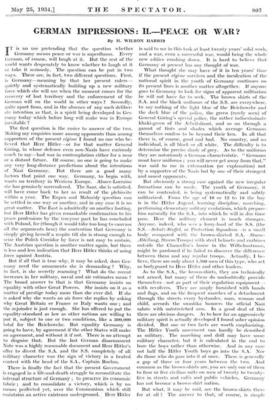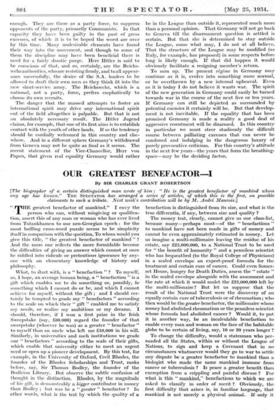GERMAN IMPRESSIONS : PEACE OR WAR ?
By H. WILSON HARRIS
IT is no use pretending that the question whether Germany means peace or war is superfluous. Every German, of course, will laugh at it. But the rest of the world wants desperately to know whether to laugh at it or take it seriously. The question can be put in two ways. There are, in fact, two different questions. First, is Germany—meaning by that her present rulers— quietly and systematically building up a new military force which she will use when the moment comes for the recovery of lost territory and the enforcement of the German will on the world in other ways ? Secondly, quite apart from, and.iiv the absence of any such deliber- ate intention as that,• is a spirit being developed in Ger- many today which before long will make war in Europe inevitable ?
The first question is the easier to answer of the two. Making my enquiries more among opponents than among supporters of the present regime I found no one who be- lieved that Herr Hitler—or for that matter General Goring, in whose defence even non-Nazis have curiously much to say—had war in contemplation either for a near or a distant future. Of course, no one is going to make any very long-distance predictions about the intentions of Nazi Germany. But there are a good many factors that point one way. Germany, to begin with, wants no territory in Western Europe. Alsace-Lorraine she has genuinely surrendered. The Saar, she is satisfied, will have Come back to her as result of the plebiscite within a year. The Eupen and Malmedy question can be settled in one way or' another, and in any case it is no great Matter: The East is admittedly on another footing, but Herr Hitler has given remarkable confirmation to his peace professions by the ten-year pact he has concluded with Poland, for (though it would take too long to canvass all the arguments here) the contention that Germany is simply giving herself a respite till she is strong enough to seize the Polish Corridor by force is not easy to sustain. The Austrian question is another matter again, but there is less and less indication that Herr Hitler thinks of using force against Austria.
But if all that is true why, it may be asked, does Ger- many need the armaments she is demanding ? Why, in fact, is she secretly rearming ? What do the recent increases in her military, naval and air estimates mean ? Thee broad answer to that is that Germany insists on equality with other Great Powers. 'She insists on it as 'a matter of prestige today more than' she ever did. If she is asked why she wants an air force she replies by asking why Great Britain or France or Italy wants one ; and the rejoinder is just enough. She has Offered to put the equality-standard as low as other nations are willing to put it, 'subject to one or two conditions, like a 300,000 total for the Reichswehr. But equality Germany is going to have, by agreement if the other States will make an agreement, and without it if not. There is no attempt to disguise :that: But the last German • disarmament Note was a highly reasonable document and Herr Hitler's offer to divest the S.A. and the S.S. completely of all military character was the sign of victory in a heated contest with the head of the S.A., Captain Roehm.
There is finally the fact that the present Government is engaged in a life-and-death struggle to reconstitute the internal structure of Germany ; to preserve its economic fabric ; and to consolidate a victory, which is by no means perfected' yet, over the Communism which still maintain's' an active existence underground. Herr Hitler is said to see in this task at least twenty years' solid work, and a war, even a successful war, would bring the whole new edifice crashing down. - It is hard to believe that Germany at present has any thought of war.
What thought she may have of it in ten years' time if the present regime survives and the inculcation of the national spirit in the youth of Germany continues on its present lines is another matter altogether. If anyone goes to GerMany to look for signs of apparent militarism he will not have far to seek: The brown shirts of the S.A. and the black uniforms of the S.S. are everywhere, to say nothing of the light blue of the Reichswehr - and the dark blue of the police, the green (rarely seen) of General Goring's- special police, the rather indiscriminate khaki-green of the A rbeitsfront, and so on through a gamut of tints and shades which average Germans themselves confess to be beyond their ken. In all that there is, of course, good and bad. No country, and no individual, is all black or all white. The difficulty is to determine the precise shade of grey. As to the uniforms they are notoriously a German characteristic. " Germans must have uniforms ; you will never get away from that," was said to me in extenuation (or explanation) not by a supporter of the Nazis but by one of their strongest and sanest opponents; But obviously a strong case against the new irregular formations can be made. The youth of Germany, it can be contended, is being systematically and 'subtly militarized. From the age of 10 or 12 to 18 the boy is in the Hitler Jugend, learning discipline, marching, performing elementary niilitary evolutions, which prepare him naturally for the S.A., into which he will in due time pass. Here the military element is much stronger.. Anyone, indeed, who sees a lorry-load of the S.S. (the S.S.—Schutz-Siaffel, or Protection Squadron—is a small body compared with the brown-shirted S.A.—Sturm- Abteilung, Storm-Troops) with steel helmets and carbines. outside the Chancellor's house in the Wilhelmstrasse,' might be pardoned if he failed to discover the difference between them and any regular troops. Actually, I lieve, there are only about 1,500 men of this type, who act as bodyguard to Herr Hitler and other leaders.
As to the S.A., the brown-shirts, they aro technically not armed, but many of them do undoubtedly provide themselves—not as part of their regulation equipment— with revolvers. They arc amply furnished with bands and flags, and on the frequent marches of a detachment through the streets every bystander, man, woman and child, accords the swastika banners the official Nazi salute with outstretched arm. In a good deal of this there are obvious dangers. As to how far an aggressively military spirit is actually developed I found sober opinion divided. But one or two facts are worth emphasizing. The Hitler Youth movement can hardly be described as military. The marching and drill may have some military character, but it is calculated in the end to bore the boys rather than otherwise. And in any ease not half the Hitler Youth boys go into the S.A. Nor do those who do pass into it at once. There is generally a gap of three or four years between the two. And common as the brown-shirts are, you see only one of them to four or five civilian suits on men of twenty to twenty- five in streets and cafes and public vehicles. Germany has not become a brown-shirt nation.
But what, it may be said, are the brown-shirts there for at all ? The answer to that, of course, is simple enough. They are there as a party force, to suppress opponents of the party, primarily Communists. In that capacity they have been guilty in the past of gross excesses, of which it is to be hoped the worst are over by this time. Many undesirable elements have found their way into the movement, and though to some of them the discipline may have been beneficial there is need for a fairly . drastic purge. Herr Hitler is said to be conscious of that, and so, certainly, are the Reichs- wehr authorities, who are resisting firmly, and to all appear- ance successfully, the desire of the S.A. leaders to be allowed to draft their own men as they think fit into the new short-service army. The Reichswehr, which is a national, not a party, force, prefers emphatically to choose its own recruits.
The danger that the massed attempts to foster an international spirit may drive any international spirit out of the field altogether is palpable. But that is not an absolutely necessary result. The Hitler Jugend claims, for example, that one of its first aims is to establish contact with the youth of other lands. If so the tendency should be cordially welcomed in this country and else- where. And in a different sphere Germany's withdrawal from Geneva may not be quite as final as it seems. The recent statement of the Vice-Chancellor, Herr von Papen, that given real equality Germany would rather be in the League than outside it, represented much more than a personal opinion. That Germany will not go back to Geneva till the disarmament question is settled is certain. But that she is determined to stay outside. the League, come what may, I do not at all believe. That the structure of the League may be modified (as Italy, for example, has proposed) in some respects before long is likely enough. If that did happen it would obviously facilitate a resigning member's return.
To sum up. The present regime in Germany may continue as it is, evolve into something more normal, or be overthrown by a new internal upheaval. Even as it is today I do not believe it wants war. The spirit of the new generation in Germany could easily be turned towards war in the course of the next five or ten years. If Germany can still be depicted as surrounded by potential enemies it certainly will be. But that develop- ment is not inevitable. If the equality that has been promised Germany is made a reality a good deal of aggressive resentment will be disarmed. In this country in particular we must steer studiously the difficult course between palliating excesses that can never be condoned and indulging in the dangerous luxury of purely provocative criticism. For this country's attitude in the next few years—the years that form the breathing- space—may be the deciding factor.

















































 Previous page
Previous page